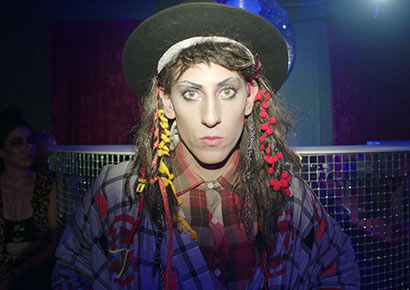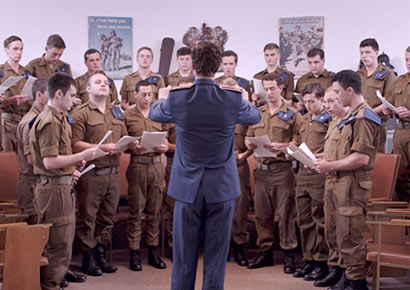Review: Kanarie is a coming out story that sings on screen
 There’s a new acclaimed gay film in cinemas. Kanarie is the latest award-winning exploration of queer identity within a uniquely South African context that brings up complex emotions.
There’s a new acclaimed gay film in cinemas. Kanarie is the latest award-winning exploration of queer identity within a uniquely South African context that brings up complex emotions.
This engaging Afrikaans musical drama has won numerous international and local awards. It comes in the wake of the recent gay love story Inxeba (The Wound), which caused national controversy for depicting same-sex love in a deeply traditional cultural context.
Kanarie is seemingly set in a whole other universe (yet, in the same country). It’s the 1980s and small town 18-year-old schoolboy Johan Niemand (Schalk Bezuidenhout) is called up for compulsory military service to defend the “Vaderland” from the “communists”.
The apartheid army is no place for a Boy George fan like Johan, who is still coming to grips with his sexuality. His best hope is to make use of his musical talents to apply for a spot in the Kanaries (Canaries), the national defence force choir.
He gets accepted and goes on a life-changing journey of discovery about himself and to some extent the nature of the country he lives in. There’s comedy, there are a few musical numbers and there are powerful dramatic moments.
At its heart, Christiaan Olwagen’s Kanarie is a personal story about coming of age and coming out – and it’s based on the filmmakers’ own experiences. Bezuidenhout – who is best known for his comedy – stands out as the lead character. His Johan is forced to question his sexuality, religion and sense of patriotism. At one key point, Bezuidenhout heartbreakingly depicts one of the most excruciating coming out scenes I’ve seen on screen.
The characters are for the most part hugely entertaining and captivating; especially the members of the choir. While there are one or two instances bordering on caricature, the performances overwhelming ring true. There are fantastic cameos by veteran Afrikaans actors, such as the brilliant Anna Mart, throughout the film that help bring Kanarie to life.
It is a beautifully crafted film, from its masterful script (co-written by Olwagen and Charl-Johan Lingenfelder) to its cinematography (Chris Vermaak). In particular, its depiction of 80s (white?) South Africa is impressive: The pop music, the clothes, the decor and, of course, the sense of stifling racist and Calvinist paranoia. There will likely be a conflicting sense of nostalgia and revulsion for most South Africans who lived through that era.
It is admittedly uncomfortable to see a South African film in 2018 in which the only people of colour are background service staff. The on-screen display of the old South African flag is also cringeworthy (in fact, at one preview screening an audience member walked out). However, Kanarie is Johan’s story within a particular personal and historical point in time – in which this would have been his myopic reality.

Inxeba and Kanarie are each located within their own cultural context: Inxeba depicting the Xhosa community and Kanarie, the apartheid-era Afrikaans community. In that sense they are quite insular and worlds apart from each other but hopefully they represent a growing diversity in telling the stories of South African LGBTQ people from all backgrounds.
I hope that Kanarie won’t only connect with members of the Afrikaans community. That would be a shame. While not being able to speak for all, I’d like to think that the angst and turmoil of grappling with identity and self will resonate with (queer) people of all kinds. Kanarie is a remarkable South African film and a stellar example of queer storytelling.
Kanarie is out now in cinemas across South Africa.
This is probably the worst gay-themed movie I have seen; and I have seen MANY! It started off on quite a high for the first 25 minutes or so and then it just went downhill. Why having all that swearing in every second line? The sex scenes were total OTT! Acting was good but the storyline and directing did not do the movie any good. Eventually one feels totally disappointed (and empty) at the end of a movie that could have been great. I cannot understand why it won any awards. Perhaps the people involved in the making of the movie (ALL of them) should have taken some tips from a movie like ‘Call me by your name’.
I think it all comes down to lived experiences and frames of reference. To me, this was one of the most realistic films I have ever seen. The fears and depiction of conscription and army life (the swearing in every second line, and the “photo stills” of the boys on the order), the power relations, the impossibility of escaping the church’s ever present eyes, stolen kisses in secret, much needed criticism about the army’s relationship with the church (the English lady) yet directed at the wrong people, the fact that individuality was not possible and being constantly watched. Wanting to escape and not being able to. Feeling ashamed after your first sexual encounter because of your own homophobia. All of this is very realistic to many who lived through it.
Johann’s emotional coming out scene was difficult to watch.
Also, there are many similarities between KANARIE and Inxeba, especially concerning power relations; the way individuality and change is oppressed in favour of the norm. Both films also shine a light on toxic masculinity and the way patriarchy victimatises and ensnares men.
Thank god, our stories are being told.
I was there myself – basics in 1979, then 9 months JL’s, then one year at Ruacana, plus six camps (of which 3 were border camps) afterwards. Inxeba was 300% better than this movie in my opnion. Kanarie was just TOO much— trying to bring some things/ideas across. Way too much dialogue was used when silent moments would have been MUCH more powerful and effective. The idea of the movie was great; the execution of it however failed big time!